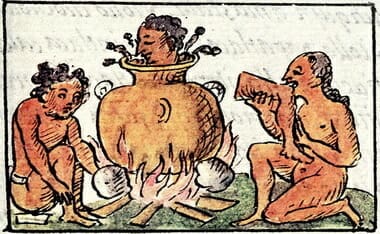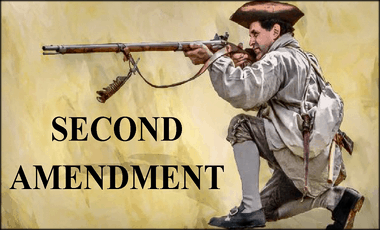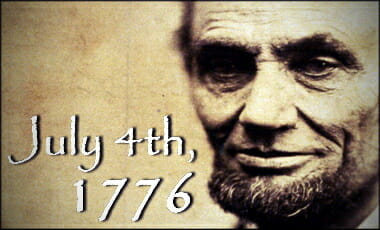…let’s move to Columbus and the charge of genocide. The historical Columbus was a Christian explorer. Howard Zinn makes it sound like Columbus came looking for nothing but gold, but Columbus was equally driven by a spirit of exploration and adventure. When we read Columbus’s diaries we see that his motives were complex: he wanted to get rich by discovering new trade routes, but he also wanted to find the Garden of Eden, which he believed was an actual undiscovered place. Of course Columbus didn’t come looking for America; he didn’t know that the American continent existed. Since the Muslims controlled the trade routes of the Arabian Sea, he was looking for a new way to the Far East. Specifically he was looking for India, and that’s why he called the native peoples “Indians.” It is easy to laugh at Columbus’s naïveté, except that he wasn’t entirely wrong. Anthropological research has established that the native people of the Americas did originally come from Asia. Most likely they came across the Bering Strait before the continents drifted apart.
We know that, as a consequence of contact with Columbus and the Europeans who came after him, the native population in the Americas plummeted. By some estimates, more than 80 percent of the Indians perished. This is the basis for the charge of genocide. But there was no genocide. Millions of Indians died as a result of diseases they contracted from their exposure to the white man: smallpox, measles, cholera, and typhus. There is one isolated allegation of Sir Jeffrey Amherst (whose name graces Amherst College) approving a strategy to vanquish a hostile Indian tribe by giving the Indians smallpox-infected blankets. Even here, however, it’s not clear the scheme was actually carried out. As historian William McNeill documents in Plagues and Peoples, the white man generally transmitted his diseases to the Indians without knowing it, and the Indians died in large numbers because they had not developed immunities to those diseases. This is tragedy on a grand scale, but it is not genocide, because genocide implies an intention to wipe out a people. McNeill points out that Europeans themselves had contracted lethal diseases, including the pneumonic and the bubonic plagues, from Mongol invaders from the Asian steppes. The Europeans didn’t have immunities, and during the “Black Death” of the fourteenth century one-third of the population of Europe was wiped out. But no one calls these plagues genocide, because they weren’t.
It’s true that Columbus developed strong prejudices about the native peoples he first encountered—he was prejudiced in favor of them. He praised the intelligence, generosity, and lack of guile among the Tainos, contrasting these qualities with Spanish vices. Subsequent explorers such as Pedro Alvares Cabral, Amerigo Vespucci (from whom we get the name “America”), and Walter Raleigh registered similar positive impressions. So where did Europeans get the idea that Indians were “savages”? Actually, they got it from their experience with the Indians. While the Indians Columbus met on his first voyage were hospitable and friendly, on subsequent voyages Columbus was horrified to discover that a number of sailors he had left behind had been killed and possibly eaten by the cannibalistic Arawaks.
When Bernal Diaz arrived in Mexico with the swashbuckling army of Hernán Cortes, he and his fellow Spaniards saw things they had never seen before. Indeed they witnessed one of the most gruesome spectacles ever seen, something akin to what American soldiers saw after World War II when they entered the Nazi concentration camps. As Diaz describes the Aztecs, in an account generally corroborated by modern scholars, “They strike open the wretched Indian’s chest with flint knives and hastily tear out the palpitating heart which, with the blood, they present to the idols in whose name they have performed the sacrifice. Then they cut off the arms, thighs and head, eating the arms and thighs at their ceremonial banquets.” Huge numbers of Indians—typically captives in war—were sacrificed, sometimes hundreds in a single day. Yet in a comic attempt to diminish the cruelty of the Aztecs, Howard Zinn remarks that their mass murder “did not erase a certain innocence” and he accuses Cortes of nefarious conduct “turning Aztec against Aztec.”
If the Aztecs of Mexico seemed especially bloodthirsty, they were rivaled by the Incas of South America who also erected sacrificial mounds on which they performed elaborate rites of human sacrifice, so that their altars were drenched with blood, bones were strewn everywhere, and priests collapsed from exhaustion from stabbing their victims.
Even while Europeans were startled and appalled at such bloodthirstiness, there was a countercurrent of admiration for what Europeans saw as the Indians’ better qualities. Starting with Columbus and continuing through the next few centuries, native Indians were regarded as “noble savages.” They were admired for their dignity stoicism, and bravery. In reality, the native Indians probably had these qualities in the same proportion as human beings elsewhere on the planet. The idealization of them as “noble savages” seems to be a projection of European fantasies about primitive innocence onto the natives. We too—and especially modern progressives-have the same fantasies. Unlike us, however, the Spanish were forced to confront the reality of Aztec and Inca behavior. Today we have an appreciation for the achievements of Aztec and Inca culture, such as its social organization and temple architecture; but we cannot fault the Spanish for being “distracted” by the mass murder they witnessed. Not all the European hostility to the Indians was the result of irrational prejudice.
While the Spanish conquistadores were surprised to see humans sacrificed in droves, they were not shocked to witness slavery, the subjugation of women, or brutal treatment of war captives—these were familiar enough practices from their own culture. Moreover, in conquering the Indians, and establishing alien rule over them, the Spanish were doing to the Indians nothing more than the Indians had done to each other. So from the point of view of the native Indian people, one empire, that of Spain, replaced another, that of the Aztecs. Did life for the native Indian get worse? It’s very hard to say. The ordinary Indian might now have a higher risk of disease, but he certainly had a lower risk of finding himself under the lurid glare of the obsidian knife.
What, then, distinguished the Spanish from the Indians? The Peruvian writer and Nobel laureate Mario Vargas Llosa offers an arresting answer. The conquistadores who came to the Americas, he concedes, were “semi-literate, implacable and greedy.” They were clearly believers in the conquest ethic—land is yours if you can take it. Yet these semi-literate greedy swordsmen, without knowing it, also brought with them something new to the Americas. They brought with them the ideas of Western civilization, from Athenian rationalism to Judeo-Christian ideas of human brotherhood to more modern conceptions of self-government, human rights, and property rights. Some of these ideas were nascent and newly developing even in the West. Nevertheless, they were there, and without intending to do so, the conquistadors brought them to the Americas.
To appreciate what Vargas Llosa is saying, consider an astonishing series of events that took place in Spain in the early sixteenth century. At the urging of a group of Spanish clergy, the king of Spain called a halt to Spanish expansion in the Americas, pending the resolution of the question of whether American Indians had souls and could be justly enslaved. This seems odd, and even appalling, to us today, but we should not miss its significance. Historian Lewis Hanke writes that never before or since has a powerful emperor “ordered his conquests to cease until it was decided if they were just.” The king’s actions were in response to petitions by a group of Spanish priests, led by Bartolomé de las Casas. Las Casas defended the Indians in a famous debate held at Valladolid in Spain. On the other side was an Aristotelian scholar, Juan Sepulveda, who relied on Aristotle’s concept of the “natural slave” to argue that Indians were inferior and therefore could be subjugated. Las Casas countered that Indians were human beings with the same dignity and spiritual nature as the Spanish. Today Las Casas is portrayed as a heroic eccentric, but his basic position prevailed at Valladolid. It was endorsed by the pope, who declared in his bull Sublimns Deus, “Indians… are by no means to be deprived of their liberty or the possessions of their property… nor should they be in any way enslaved; should the contrary happen it shall be null and of no effect.” Papal bulls and even royal edicts were largely ignored thousands of miles away—there were no effective mechanisms of enforcement. The conquest ethic prevailed. Even so, over time the principles of Valladolid and Sublimus Deus provided the moral foundation for the enfranchisement of Indians. Indians could themselves appeal to Western ideas of equality, dignity, and property rights in order to resist subjugation, enforce treaties, and get some of their land back….
[….]
The white men who settled America didn’t come as foreign invaders; they came as settlers. Unlike the Spanish, who ruled Mexico from afar, the English families who arrived in America left everything behind and staked their lives on the new world. In other words, they came as immigrants. We can say, of course, that immigration doesn’t confer any privileges, and just because you come here to settle doesn’t mean you have a right to the land that is here, but then that logic would also apply to the Indians.
DINESH D’SOUZA, America: Imagine a World Without Her (Washington, DC: Regnery, 2014), 93-97, 98.



















